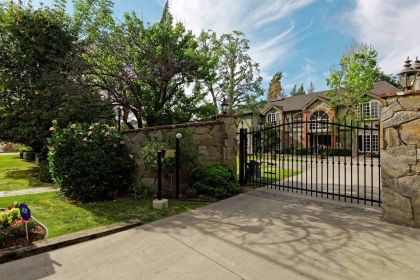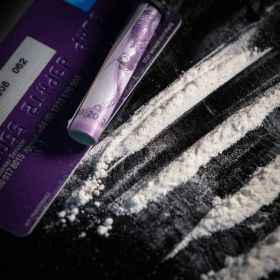Fentanyl Rehab in Los Angeles, CA for Addiction Recovery
Fentanyl Recovery in Los Angeles, California
Fentanyl is a synthetic opioid narcotic. The powerful drug has a high potential for misuse, dependence, and overdose, and it is between 50 and 100 times more potent than morphine. Over the past decade, rates of fentanyl overdose have climbed significantly. Fentanyl rehab in Los Angeles, CA through Harmony Place offers safe and effective treatment that can lead to a lifetime of relief.
Additionally, a large amount of illicitly manufactured fentanyl has been found in the U.S. drug supply in recent years. Illicit fentanyl is frequently combined with other substances (heroin, cocaine, counterfeit prescription pills) in order to increase their potency. Many people who lose their lives to fentanyl overdose consume the substance unknowingly.
If you or someone you love has been struggling with a fentanyl use disorder, Harmony Place is available to help. We offer several effective levels of clinical care, meeting our clients exactly where they are and helping them build solid foundations for continued recovery. To learn more about our Los Angeles, California fentanyl addiction treatment program, contact us today.

Free Fentanyl Addiction Assessment
Available Fentanyl Addiction Treatment Options in Los Angeles, CA
At Harmony Place, we recognize the profound challenges faced by individuals battling addiction. Our fentanyl treatment center in Los Angeles is dedicated to providing a compassionate, supportive, and empowering environment for recovery. By offering a comprehensive range of services tailored to meet the unique needs of each individual, we strive to make recovery a realistic and attainable goal.
We offer a range of treatment services to individuals living in Los Angeles, California. Our fentanyl addiction recovery program combines evidence-based therapies with holistic modalities and trauma-informed care. We offer dual-diagnosis treatment services to those struggling with a co-occurring fentanyl addiction and mental health condition. Contact us today to get started. We can check your insurance coverage or explain the cost of addiction treatment without insurance.
Levels of treatment for Fentanyl addiction may include:
Fentanyl Detox Center in LA, California
Detoxification is an essential first step in overcoming fentanyl addiction. Our fentanyl detox center in Los Angeles provides a safe and medically supervised environment where individuals can begin their recovery journey. The process of fentanyl detoxification helps manage withdrawal symptoms and stabilize the individual’s health, laying a solid foundation for further treatment.
At our California fentanyl detox facility, experienced medical professionals provide round-the-clock care to ensure safety and comfort during this challenging phase. We employ evidence-based practices to mitigate withdrawal symptoms and promote physical stabilization. This initial step is crucial in preparing individuals for the subsequent phases of their recovery journey, enabling them to focus on healing and rebuilding their lives.
Medication-Assisted Treatment (MAT) for Fentanyl Recovery
Medication-Assisted Treatment (MAT) combines FDA-approved medications with counseling and behavioral therapies to support recovery from fentanyl addiction. At Harmony Place, our MAT program in Los Angeles is designed to help manage cravings, reduce the risk of relapse, and enhance the overall effectiveness of traditional therapeutic methods.
By integrating MAT into our fentanyl recovery program in Los Angeles, we provide a comprehensive framework that addresses both the physical and mental aspects of addiction. Medications used in MAT can help stabilize brain chemistry and alleviate some of the most challenging aspects of withdrawal. When combined with ongoing therapy and support, MAT offers a robust pathway to sustained recovery. Our dedicated team ensures that each client receives a personalized MAT plan tailored to their specific needs, promoting long-term success in overcoming fentanyl addiction.
Residential Fentanyl Addiction Treatment in Los Angeles
For those requiring intensive support, our residential fentanyl addiction treatment program offers a structured and immersive environment. Located in Woodland Hills, our facility provides 24/7 medical supervision, therapeutic interventions, and a supportive community committed to sobriety. This program is ideal for individuals with severe addiction who need a high level of care.
Our residential fentanyl addiction treatment in Los Angeles includes personalized therapy sessions, group counseling, and holistic wellness activities designed to address the multifaceted nature of addiction. By fostering a nurturing and empowering environment, we help clients develop the skills and resilience necessary for long-term sobriety. This comprehensive approach ensures that each person receives the individualized attention they need to thrive in their recovery journey.
Outpatient Fentanyl Addiction Treatment in Southern California
Outpatient fentanyl addiction treatment offers a flexible alternative for individuals who need to balance recovery with daily responsibilities such as work or family commitments. At Harmony Place, our outpatient programs in Los Angeles provide structured support without requiring clients to stay at the facility. This makes it an ideal option for those with mild to moderate addiction or those transitioning from inpatient care.
In our outpatient fentanyl addiction treatment program, clients attend scheduled therapy sessions, support groups, and medical check-ups. This structure allows individuals to apply coping strategies in real-time while still receiving professional guidance and support. Our goal is to provide continuous care that fits seamlessly into their lives, ensuring they remain connected to their recovery community and supported in their journey toward lasting sobriety.
IOP is a step down from PHP and is an ideal option for those with mild or moderate substance use disorders and no co-occurring issues. In many cases, IOP is used as a supplemental level of care for those who have already completed residential treatment and PHP, but it can be effective as a stand-alone treatment option.
Partial Hospitalization Fentanyl Recovery Program
PHP is similar to residential treatment, however, clients are able to return home once they complete a full day of treatment. At Harmony Place, we provide a comprehensive PHP program that can serve as a step-down or stand-alone treatment option. Our fentanyl PHP program focuses on laying a stable foundation for long-term drug addiction recovery.
Fentanyl Addiction Counseling and Therapy
Counseling and therapy are integral components of effective fentanyl addiction treatment. At Harmony Place, we offer a range of personalized counseling and therapy services designed to address the psychological aspects of addiction. Through individual and group sessions, clients explore the root causes of their substance use and develop healthier coping mechanisms.
Our therapists utilize evidence-based approaches such as cognitive-behavioral therapy (CBT) and dialectical behavior therapy (DBT) to help clients navigate the complexities of addiction and recovery. Group therapy sessions provide a supportive space for individuals to share their experiences and learn from others facing similar challenges. These therapeutic modalities are essential for building resilience and fostering a deeper understanding of one’s journey toward recovery.
Holistic Fentanyl Recovery Treatment Los Angeles
At Harmony Place, we believe in a holistic approach to fentanyl recovery that addresses mind, body, and spirit. Our holistic fentanyl recovery treatment in Los Angeles incorporates a variety of wellness activities designed to complement traditional therapeutic methods. These activities include yoga, meditation, nutritional counseling, and fitness programs, all aimed at promoting overall well-being and enhancing the recovery process.
Holistic treatment recognizes that recovery is about more than just abstaining from substances; it’s about achieving a balanced and fulfilling life. By integrating holistic practices into our treatment plans, we help clients develop a deeper connection to themselves and their recovery journey. This comprehensive approach empowers individuals to embrace long-term sobriety and build a healthier, more satisfying life free from addiction.
Addiction Aftercare Service
After the completion of an inpatient or outpatient rehab program, patients must have an aftercare plan in place to help them lower the chance of relapse. Aftercare plans may include living in a sober living facility, attending 12-step meetings, going to behavioral therapy, using stress management techniques, and more.
Recovery is a lifelong process, and people who are dealing with meth addiction must continue to work the steps of their recovery to maintain their sobriety. While relapse is common, it doesnt have to be a part of the recovery process, especially with a comprehensive aftercare plan in place.
What Is Fentanyl?
According to the National Institute on Drug Abuse (NIDA), “Fentanyl is a prescription drug that is also made and used illegally. Like morphine, it is a medicine that is typically used to treat patients with severe pain, especially after surgery. It is also sometimes used to treat patients with chronic pain who are physically tolerant to other opioids. Tolerance occurs when you need a higher and/or more frequent amount of a drug to get the desired effects.”
When prescribed by a medical professional, fentanyl is commonly given as a shot (intravenously). The synthetic opioid can also be prescribed in the form of a patch that is applied directly on a person’s skin, or in the form of lozenges that are taken orally. Even when taken exactly as prescribed, fentanyl use can lead to the development of physical and psychological dependence. Once dependence occurs, it is crucial for a person to seek professional help like our fentanyl rehab in Los Angeles.
Synthetic opioids like fentanyl are now the most common drugs involved in drug overdose deaths throughout the U.S. NIDA states, “The illegally used fentanyl most often associated with recent overdoses is made in labs. This synthetic fentanyl is sold illegally as a powder, dropped onto blotter paper, put in eye droppers and nasal sprays, or made into pills that look like other prescription opioids.”
How Does Fentanyl Work?
Like other opioid narcotics, fentanyl works by binding to opioid receptors in the brain. These receptors control functions like emotional regulation and pain. If a person takes fentanyl for a prolonged period of time, their brain and central nervous system adjust to the presence of the chemical substance. The person might find it difficult to experience feelings of pleasure without the use of fentanyl, and they might experience fentanyl withdrawal symptoms if they attempt to stop using the drug.
When a person becomes physically dependent, they lose control over their fentanyl intake. They use fentanyl compulsively, despite negative personal consequences. At this point, professional intervention is necessary.
Check Your Insurance Coverage
We are an in-network provider with Anthem, First Health Network, Multi-Plan, Beacon, HMC, Humana, Aetna
Fentanyl Use Statistics in Los Angeles, California
Fentanyl misuse, addiction, and overdose are escalating issues throughout the country. However, some regions are more impacted than others. The State of California has been devastated by the growing presence of synthetic opioids. According to the California Department of Public Health, “In 2021, there were nearly 6,000 opioid-related overdose deaths in California. This is what makes fentanyl rehab in Los Angeles so imperative.
A recent article published by Cal Matters, a California-based news organization, states, “On an average day in California, about 18 people die due to overdoses from fentanyl and other synthetic opioids. That works out to nearly four people every five hours.”
The Ongoing Opioid Epidemic in Los Angeles
The County of Los Angeles Public Health 2021 Data Report states, “In 2021, methamphetamine and fentanyl were the most common drug types listed as a cause of death in accidental drug overdose deaths in Los Angeles County (LAC), accounting for 56% and 55%, respectively, of all alcohol and other drug overdose deaths. Accidental fentanyl overdose deaths increased 1,280% from 109 in 2016 to 1,504 in 2021. From 2016 to 2020 fentanyl overdose ER visits increased 308% from 133 to 542, and fentanyl, and fentanyl overdose hospitalizations increased 98% from 102 to 202 cases.”
In response to increasing rates of opioid overdose in Los Angeles, Harmony Place has developed an effective and accessible treatment program. We work directly with most major regional and national health insurance providers. Consequently, our treatment services are readily available to those in need. Contact our 24/7 hotline at (855) 652-9048 to learn more about fentanyl rehab in Los Angeles.
Additional Resources
Request a 100% Confidential Callback
Signs & Symptoms of Fentanyl Addiction
The Diagnostic and Statistic Manual of Mental Disorders, Fifth Edition (DSM-V) includes a list of criteria a person must meet in order to be diagnosed with a fentanyl use disorder.
- A person uses fentanyl in greater amounts than intended for longer periods of time than intended.
- A person has repeatedly attempted to cut back on fentanyl use or quit entirely with limited or short-term success.
- A person spends a significant amount of time obtaining fentanyl, using fentanyl, and recovering from its effects.
- A person has experienced a range of physical and psychological problems directly related to fentanyl use.
- A person experiences an increase in risk-taking behavior facilitated by fentanyl use. For example, a person might combine multiple substances at one time, or repeatedly drive while under the influence of opioid narcotics.
- A person gives up or neglects activities that were previously enjoyed.
- A person experiences a range of personal consequences directly linked to fentanyl use. These problems could include interpersonal relationships, financial issues, legal issues, and health issues.
- A person develops a physical tolerance for fentanyl. This means that the person must use more of the drug in order to experience the desired effects.
- A person neglects personal responsibilities and obligations.
- Withdrawal symptoms occur when a person stops using fentanyl abruptly.
- A person experiences physical and psychological fentanyl cravings.
-
Absolutely the best recovery center around.
I am forever grateful to have had this experience. I would recommend anyone who wanted help to come here. This place literally saved my life. I have overcome so many obstacles that always stood in the way of my recovery. It’s not just because I was ready… the approaches the therapists use come from an empathetic, compassionate, and understanding place. They were able to hold the mirror up and help guide me through making solid changes.
Daniel H.
August 2017 -
This place literally saved my life.
After overdosing, my parents forced me to check into rehab.After interviewing many other facilities, I decided to go to Harmony Place from my home in Phoenix. I was struggling with…a drug addiction and had been trying for years to recover. In the past, left 2 treatment centers AMA and 1 AWOL. I had very negative experiences in the other treatment facilities, especially with my therapists, so I didn’t go in with an open mind or good attitude- even though they worked with my parents regarding finances. However, the staff was patient with me. The techs were kind, knowledgeable, and many were in recovery themselves.
Mary M. -
They Answered on the First Call
When I called Harmony Place…I knew immediately that this was the right place for my child… Harmony Place is specifically designed for…and tailored to providing a safe environment. The staff [are knowledgeable and some are in recovery]. The staff knew each client and were on top of each client’s progress. Harmony Place has a small clientele and each client are able to receive all the help they were entitled to. I would recommend Harmony Place to anyone who is looking for a small setting… My daughter is currently going into sober living and her counselors did a wonderful job in finding a right fit for her – affordable, safe and a good environment for her.
Robyn
Loved-One -
I’ve Been Searching for the Perfect Words…
I left Harmony Place in August of 2015 and I have been searching for the perfect words to describe my experience during my stay; and still I can’t really find them. How do you really describe a place with a staff and a program that saved you? Addiction is a terrible thing to go through and a heart breaking thing for your loved ones to watch. Many people, including myself go into different treatment centers throughout their addiction searching for ways to find recovery. Nothing worked for me, not the 5 rehab stays I had, then, I came here.
Dominique C.
Alumni
Don’t Wait Any Longer. Reach Out & Begin Your Journey of Healing Today.
Does Insurance Offer Coverage for Fentanyl Rehab in Los Angeles, CA?
Yes, insurance often covers fentanyl rehab in Los Angeles, though the extent of coverage can vary depending on the specific policy and provider. In California, many health insurance plans provide coverage for substance abuse treatment, supported by regulations like the Affordable Care Act (ACA) and the Mental Health Parity and Addiction Equity Act (MHPAEA). These laws require insurers to offer comparable coverage for mental health and substance use disorder services as they do for other medical conditions. Some prominent health insurance providers in California that generally offer coverage for fentanyl use disorder rehab include Anthem Blue Cross, Blue Shield of California, and Cigna.
At Harmony Place, we understand that navigating the complexities of insurance can be daunting. Our dedicated admissions team is here to help you verify your coverage and understand the details of your plan. We work closely with your insurance provider to ensure you receive the maximum benefits available, enabling you to focus on your fentanyl addiction treatment journey without undue financial stress.
How Much Does Fentanyl Rehab Cost Without Insurance in Los Angeles, CA?
The cost of fentanyl rehab in Los Angeles, CA without insurance can vary widely depending on the type and length of the program. On average, the daily rate for inpatient rehab ranges from $500 to $1,000. For a typical 30-day treatment program, individuals can expect to pay between $15,000 and $30,000. Outpatient programs tend to be more affordable, with costs generally ranging from $100 to $500 per session, depending on the level of care required.
Investing in professional treatment is a vital step towards achieving lasting recovery and overall well-being. At Harmony Place, we are committed to making treatment accessible to everyone in need. To support this, we offer various payment plans and financial assistance options to help ease the financial burden. We aim to ensure that paying for fentanyl recovery in Los Angeles does not become a barrier to receiving the high-quality care necessary for a successful recovery journey.
Fentanyl Addiction Treatment in Los Angeles
Harmony Place offers safe, evidence-based treatment for fentanyl addiction in Los Angeles, California. Our programs include medical detox, withdrawal care, and both inpatient and outpatient rehabilitation options. Explore the fentanyl treatment programs below to learn how Harmony Place can help you or your loved one begin recovery.
- Alcohol Addiction Rehab
- Drug Addiction Rehab
- Cocaine Addiction Rehab
- Fentanyl Addiction Rehab
- Heroin Addiction Rehab
- Ketamine Addiction Rehab
- Lunesta Addiction Rehab
- Marijuana Addiction Rehab
- Meth Addiction Rehab
- Opiate Addiction Rehab
- Opioid Addiction Rehab
- Painkiller Addiction Rehab
- Sedative Addiction Rehab
- Adderall Addiction Rehab
- Ambien Addiction Rehab
- Benzo Addiction Rehab
- Halcion Addiction Rehab
- Restoril Addiction Rehab
- Codeine Addiction Rehab
- Demerol Addiction Rehab
- Hydrocodone Addiction Rehab
- Librium Addiction Rehab
- Morphine Addiction Rehab
- Mysoline Addiction Rehab
- Oxycodone Addiction Rehab
- Ritalin Addiction Rehab
- Sonata Addiction Rehab
- Suboxone Addiction Rehab
- Valium Addiction Rehab
- Vicodin Addiction Rehab
- Xanax Addiction Rehab
- Zimovane Addiction Rehab
Find Help for Fentanyl Addiction Treatment Near You in Los Angeles Today
If you or someone you love needs fentanyl addiction treatment, Harmony Place is ready to be your partner in recovery. Our fentanyl rehab in Los Angeles delivers compassionate, evidence-based care designed to lead toward healing, stability, and a drug-free life through our treatment center in Los Angeles, CA.
Don’t wait until it’s too late—start the journey of fentanyl recovery in Los Angeles with Harmony Place. Contact us to schedule a confidential fentanyl assessment, discuss rehab for fentanyl addiction options, and learn how our fentanyl treatment center in Los Angeles, CA can support you every step of the way. Your recovery begins with one call.


















